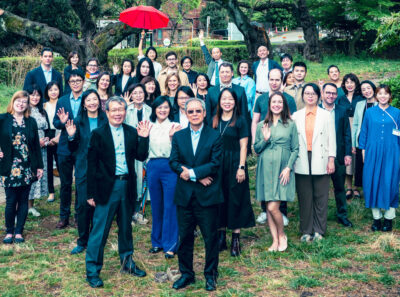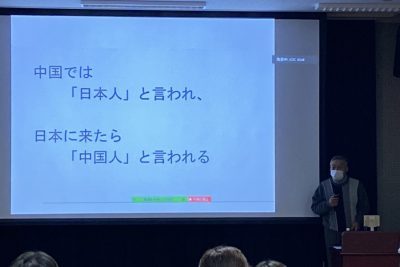Ethnographies of Life and Work: Researcher Series Ep. 3 Dr Takeo HOSHI
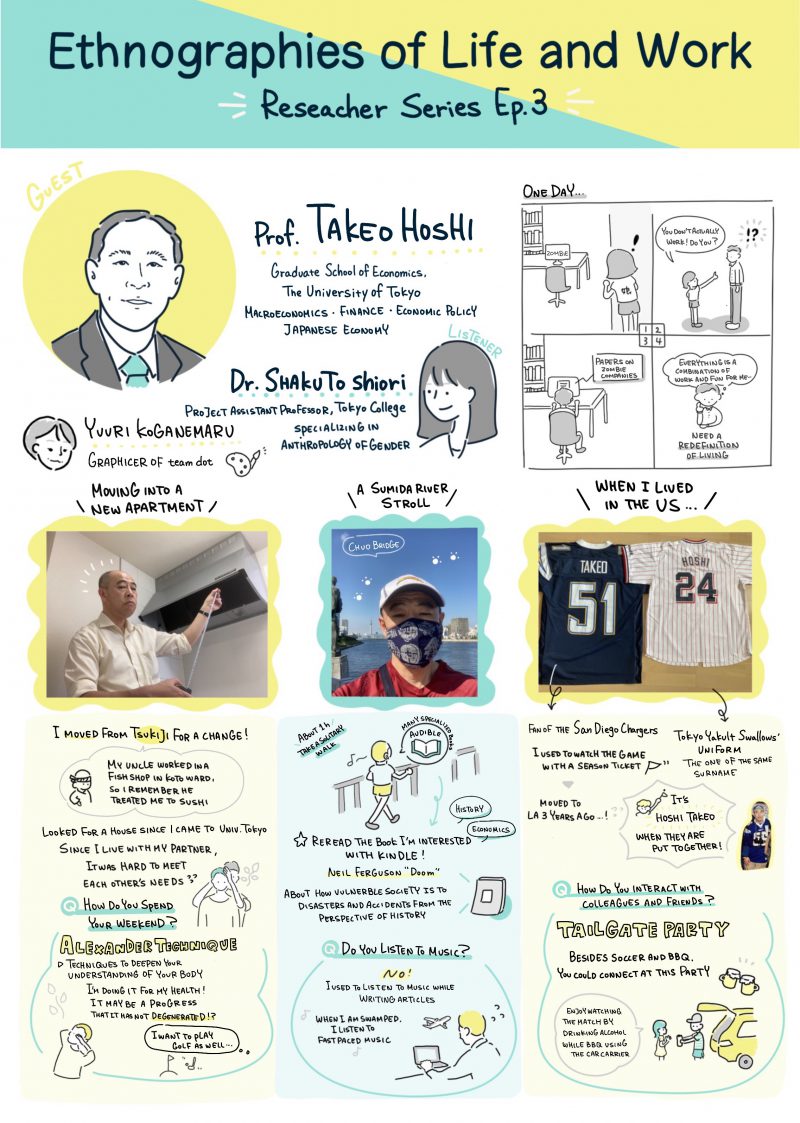
Graphic Recording ©Innovation Team dot Yuri Koganemaru
This piece is Episode 3 of the series, "Ethnographies of Life and Work: Researchers." The series invites researchers in and out of the University of Tokyo to share three images that represent "life" for them. Through the dialogue over these images, we explore the relationship between life and/in work. For the introduction to the series, see here.
The Comfort of Things
Interlocutor: Takeo HOSHI
Ethnography: SHAKUTO Shiori
Graphic recording: KOGANEMARU Yuri
It happened about 20 years ago, when Professor Hoshi had just moved homes with his two children in San Diego, California. In addition to preparing teaching materials, he had to write articles and books. Having had hardly any time to rest, he found himself rushing to his study as soon as he got home every day.
One day, his daughter came to him with a proud look on her face. “Dad, you’re always in your room, saying that you have to work, but I know it’s a lie, because I saw it.” Now she was smiling like a Cheshire cat. “Saw what?” he wondered.
“I saw your PC screen, and the word ‘zombie’ was written all over it. Dad, you’re just playing a zombie game!”
Professor Hoshi is an authority on zombie companies. The term refers to firms whose productivity is not high, but that are kept alive by government protection. The reasoning behind this protection is apparently to protect employment. However, he observes that it does not lead to the creation of new work because the economy would stagnate this way. Protecting the existing jobs can also mean losing the opportunity for workers to find better jobs. Professor Hoshi instead advocates for the protection of individual workers rather than the firms.
Little Ms. Hoshi must have caught a glimpse of one of her father’s papers on zombie firms. Her observation made him realize that his life is essentially all work, but at the same time, all play, says Professor Hoshi, who was recounting the story to us during the interview.
I met Professor Hoshi at a zoom meeting to mark the launch of UTokyo Center for Contemporary Japanese Studies (TCJS). Having just returned to Tokyo to take up a Professorship at the Economics Department, he asked the audience to “have fun” during the upcoming events and seminars. It made an impression on me, so I asked if I could interview him to unpack “fun” in his life. His response surprised me, however. “I have no ‘life’ to speak of, so I don’t really have any photos to illustrate it.”
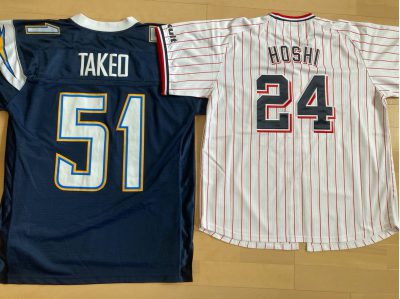
Despite the reservation, Professor Hoshi kindly agreed to an interview and showed me several photos. One of them showed two jerseys: one was for an American football team that used to be in San Diego, and the other was for the Japanese baseball team the Yakult Swallows. Laying side-by-side, the two jerseys read as “Takeo Hoshi.” The two jerseys seem to symbolize his move from the United States to Japan.
When he lived in the United States, Professor Hoshi rooted for a local team called the San Diego Chargers. Since his colleagues there called him “Takeo,” he got a jersey of the linebacker Takeo Spikes, which had “Spikes” written on it, and had the name changed to “Takeo.” Wearing the Takeo jersey, he enjoyed taking part in tailgate party – a social party that takes place usually in the stadium parking lot – with his friends, colleagues, students and children’s parents.
When he returned to Japan, the people around him started calling him Hoshi-sensei, instead of Takeo. “So I bought the jersey of the pitcher Hoshi, since it has Hoshi written on it. I thought that after the Chargers, I should go for Swallows, but because of COVID-19 there aren’t many baseball games, so I haven’t found a replacement for the Chargers yet,” says Professor Hoshi with a disappointed look. Instead, during the pandemic, he started to take walks around his neighborhood.
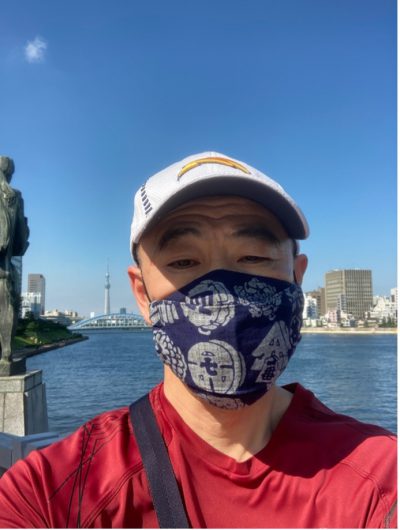
“Do you listen to music when you go for a walk?” Yuuri, a graphic recorder, asked him expectantly. “Nope.” He replied instantly. The three of us burst out laughing at his honest reply. He continued. “When I take a walk, I listen to audiobooks, not music. I listen to books that are close to my field of specialty. By that, I mean stuff that might not fit my specialized area 100%, but that are somehow related. For example, one book I recently read was Neil Ferguson’s Doom. The book traces history to show how vulnerable society is to accidents and disasters. What I do is I listen to a book first and, if I like it, I’ll buy a copy to read. Then, I’ll use it as a reference for my article.”
Just as I was about to take a note for myself having been impressed by his approach to reading and research, Professor Hoshi stopped.
“You see, I really don’t have a ‘life.’”
What is life? His response made me think. In English, the expression “switch off” is often used to talk about work-life balance. We have been told to stop thinking about work when we leave the workplace, just like flicking a power switch on and off. Hence when we hear the word “life,” we often assume that it refers to things that are unrelated to work. For Professor Hoshi, however, the lines between work and life may be more blurred. Reconsidering “life” from that perspective, his daughter was right when she said her father’s work was all play!
Later, however, I realized that it was only a partial story of his life. After finishing the interview, I noticed that the mask he was wearing in the photo was rather unusual. During the interview, it didn’t occur to me to ask about the mask itself because I was focused on the books he was listening to. I emailed Professor Hoshi to ask him about the mask and I received an instant answer. “My partner made the mask for me.” I immediately regretted not asking him more about the mask during the interview. I was fixated by activities that he did, not by things he wore during the walk, or ate during the tailgate party. We tend to elevate the status of activities at the expense of things, even though the latter often tells as much, if not more stories, about our intimate lives. I did not notice it during the interview, but on the second look, from the beginning all his pictures were about things – jerseys, masks, and the last picture, home. And it was through these things that I could get a glimpse of people that were integral to his life.
If it is not too late, I will end this ethnography by reflecting on things about life through the last picture. He told me that it took him and his partner some time to find a place to rent in Tokyo. “I wanted a house that was close to my workplace and convenient for commuting, and that had Internet access so that I could work from home, but my partner wanted a place that got a lot of sunlight, had an open kitchen, and was convenient for grocery shopping.”
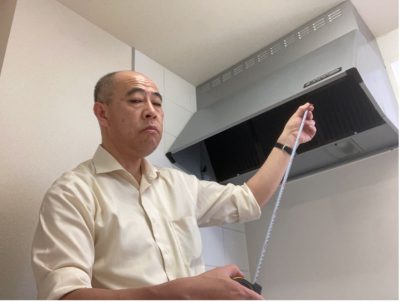
It took them several months, but they finally found a home that met both their conditions. The last photo was taken during that move. Professor Hoshi is standing in the kitchen with a tape measure in his hand. Despite his claim that he has no life, he is actively participating in their kitchen improvement project! From his new home on weekends, he goes to Alexander Technique lessons. “I’ve been following this technique since my daughter recommended it to me five or six years ago, and thanks to that, I don’t feel any physical decline.”
From sharing meals at the tailgate party with his friends who call him Takeo, to his partner making a mask for him during the pandemic, to the time spent to find a new home to house that family, the “life” that are embodied in things were not necessarily an extension of work. “I have no ‘life’ to speak of, so I don’t really have any photos to illustrate it.” Despite those words, the photos that Professor Hoshi showed me of things in his life, indicated otherwise. I felt comforted by that gap.


